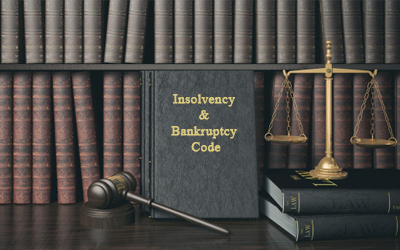IBC – DISQUALIFICATION FOR COMPROMISE AND ARRANGEMENT
The practice of jugaad is an age-old concept in India. People from all walks of life continue to unabashedly employ tactics which allow them to take advantage of the existing loopholes and achieve objectives, which they are otherwise not entitled to. From the legal standpoint there are set guidelines and principles to prevent acts which defeat the purpose sought to be achieved by a legislation.
The Latin maxim “Quando aliquid prohibetur ex directo, prohibetur et per obliquum” literally translates to “you cannot do indirectly what you cannot do directly” has been effectively used by the Courts to curtail wrongdoings.
The Hon’ble Supreme Court by way of the recent judgment of Arun Kumar Jagatramka Versus Jindal Steel and Power Ltd. & Anr. Writ Petition (C) No. 269 of 2020 endeavoured to practically revamp the existing provision, with regards to section 29A (Persons not eligible to be resolution applicant) and section 35(1) (f) (bar in sale of assets during liquidation to persons barred from being Resolution Applicant), held that the prohibition placed by the above provisions extends to scheme of compromise or arrangement under section 230 of The Companies Act, 2013 (“hereinafter referred to as the Act”), when the company is undergoing liquidation under the auspices of the Insolvency and Bankruptcy Code, 2016 (“hereinafter referred to as the Code”) .
Legal Points considered:
The court was entrusted with the task of deciding whether a person (in the present case the promoter) disqualified under Section 29A of the Code to submit a resolution plan is entitled to propose a scheme of compromise and arrangement under the Act.
In deciding the same it was important to analyse the object of the Code and the intention of the legislators to bring in the abovementioned provisions. It is pertinent to point out that by a notification in January 2020, a amendment was brought out in Regulation 2B (Compromise or arrangement) of the Liquidation Process Regulation, 2016 by way of which a person ineligible to propose a resolution plan under the Code was categorically barred from being a party to compromise or arrangement. The said amendment was also challenged being constitutionally violative of an individual’s rights in the present proceedings.
Findings:
Considering the dual tasks of deciding the interplay between the provisions of the Code and the Act. Also, the constitutional validity of Regulation 2B having an effect on the application of provisions of the Act. The Apex court adopted a flexible approach towards the same to decipher the motive and effect of the provisions.
For the same a punctilious study and further enhancement of the Swiss Ribbons judgment[1] has been made by reiterating that the purpose of the Code is to ensure revival and continuation of the Corporate Debtor by protecting the corporate debtor from its own management and from a corporate death by liquidation. In this regard the court placed further reliance on the judgment of Meghal Homes Pvt. Ltd. v. Shree Niwas Girni K.K Samiti[2] to state that any argument to co-relate withdrawal under section 12-A of the Code with a scheme of compromise and arrangement is flawed for the simple reason that the impact of a scheme when the company is in liquidation, is that the proposers of the scheme enter the management with the debt having been resolved. This aspect is not applicable for a simpliciter withdrawal. Therefore, it is erroneous to state that the provisions of withdrawal and compromise seek to achieve the same result.
In furtherance to the above, the Apex Court established by the present judgement that it is incorrect to consider the provisions of the Code in isolation to the provisions of the Act for the reason that during the process of compromise or arrangement by the liquidator appointed under the Code other activities during liquidation do not stop and hence they are required to be read in harmony.
The object of the Code was to usher a systematic change in corporate governance and the rule of law. The Code seeks to bring in good governance and these salutary and purposive mandates of the code can only be achieved if the integrity of the resolution process is given primacy. For the same it is required that the courts give a purposive interpretation to the provisions and ensure that the problems which beset the earlier regime do not enter through the backdoor.
A promoter who is disqualified under section 29-A cannot be given the liberty to participate in the scheme of arrangement for the simple reason that he is responsible for the financial turmoil of the Company and the purpose of disqualifying him at the first instance is to ensure that he or she is not allowed to further defeat the purposes of the Code.
Conclusion
I believe that the court has correctly interpretated the provisions of the Code in harmony with Section 230 of the Act to ensure that the promoters or any other person guilty of malfeasance during CIRP is barred to interfere or influence the liquidation process by relying on the findings of the Apex Court in Chitra Sharma v. Union of India[3] where the court raised concerns about persons who, with their misconduct contributed to defaults of companies are otherwise undesirable, may misuse this situation due to lack of prohibition or restrictions to participate in the liquidation process. Regulation 2B and Section 35 (1) (f) effectively form the prohibitions which prevent such wrong doings.
Based on the above findings, the Apex Court has rightly upheld the constitutional validity of Regulation 2B(1), and the prohibitions placed by the Parliament in section 29A and Section 35(1) (f) must necessarily attach itself to scheme of Compromise or arrangement, when the Company is undergoing liquidation under the auspices of the IBC for the simple reason that when a company is in liquidation under the IBC a scheme proposed under Section 230 is a facet of the liquidation process and the same rationale which permeates the liquidation process must also govern it.
– Ranit Basu | Partner
You can reach out to Ranit at ranit@bridgeheadlaw.com.
[1] Swiss Ribbons Pvt. Ltd. vs. Union of India & Ors.- Writ Petition(Civil) No.99 of 2019
[2] (2007) 7 SCC 753
[3] (2018) 18 SCC 575


